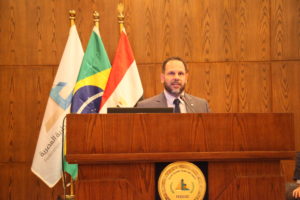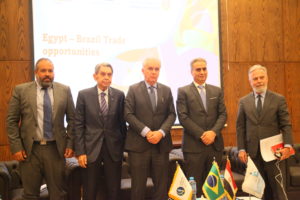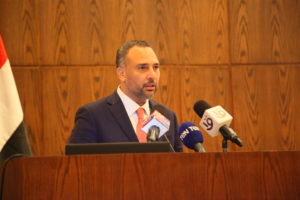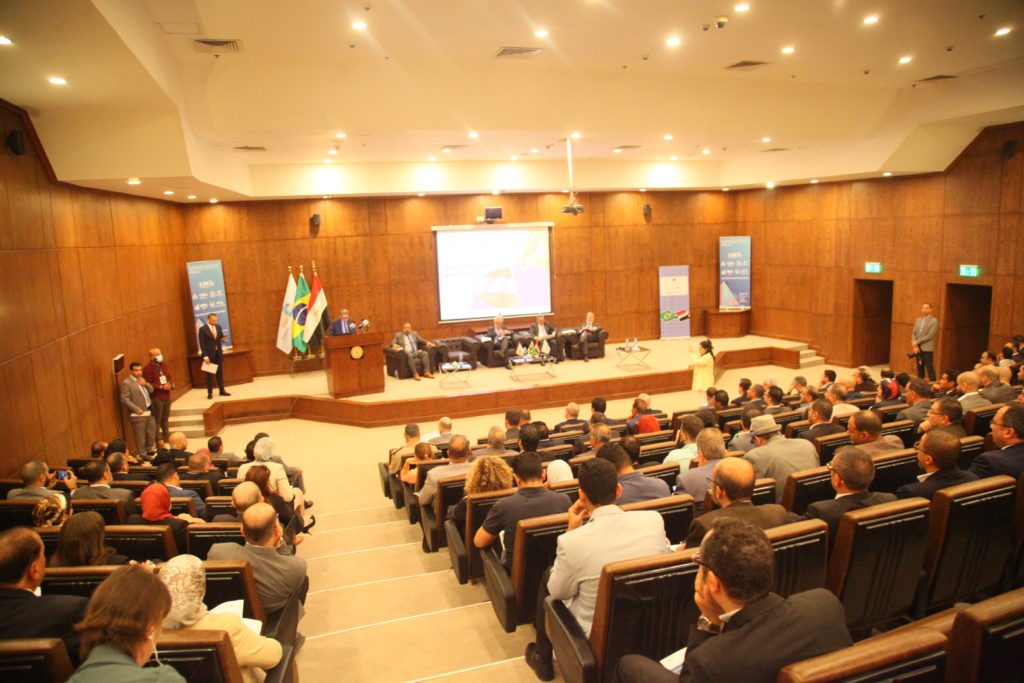Cairo – Brazil is poised to become even more important in the following years as a global food security provider, and Egypt has a relevant role in this as a fertilizer supplier to Brazil. So said representatives of the Brazilian government in the seminar “Brazil and Egypt: Opportunities in bilateral trade” on Monday (9) in Cairo, Egypt.

Held by the Arab Brazilian Chamber of Commerce (ABCC) and supported by the Embassy of Brazil in Egypt and the Federation of Egyptians Chambers of Commerce (FEDCOC), the event was one of the appointments of the Brazilian mission that is the Arab country led by Agriculture, Livestock and Supply minister Marcos Montes.
The minister spoke at the seminar about Brazil’s commitment to global food security, and the Ministry’s Projects director Luis Eduardo Pacifici Rangel detailed the subject in an outlook on the growth that the country will see in the following years in food production and the current situation of local fertilizer supply. Fertilizers are fundamental for production in farms.

“Egypt is an important fertilizer supplier to Brazil,” Rangel said. Last year, the country exported million tonnes to the Brazilian market, grossing USD 284 million. Brazil brings in 85% of the fertilizers it uses and is the world’s fourth largest consumer of nitrogen, third largest of phosphorus and second largest of potash.
According to the graphic presented by Rangel, Russia, China and Canada are Brazil’s leading fertilizer suppliers at 22%, 15% and 10% respectively of the total imports by the country, but the Arab states are also some of the leading suppliers. Morocco ranks fourth at 7%, Qatar ranks seventh at 4% and Egypt ranks ninth at 3%. Other Arab states like Oman, Algeria and Saudi Arabia are also on the list of the 20 leading suppliers. The numbers refer to NPK.

Russia, China, Qatar, Algeria and Iran are some of the leading suppliers of nitrogen fertilizers imported by Brazil, while Morocco, Russia, Saudi Arabia, the United States and China are some of the leading phosphate fertilizer suppliers. The list of major potash exporters to Brazil includes Canada, Russia, Belarus, Israel and Germany, the Ministry reported.
According to the numbers presented by Rangel based on the Food and Agriculture Organization (FAO) of the United Nations, Brazil will account for 40% of the increase in food production by 2050. The Agriculture Ministry projects that the cereal production will step up from 250.9 million tonnes in 2019/2020 to 318.3 million tonnes in 2029/2030, and meat production will increase from 28.2 million tonnes to 34.9 million tonnes.
National Plan

In a bid to ensure the fertilizer supply, the federal government created the National Fertilizer Plan that was present to the Egyptians in the seminar. The project has many fronts, including the integration with global suppliers of nitrogen, phosphorus and potash, and attracting investments in the industry. Bruno Caligaris, director of Strategic Projects at the Brazilian Presidency’s Secretariat of Strategic Affairs, detailed the plan to the audience of the event.
The fertilizer supply was also discussed by other speakers like the Brazilian Confederation of Agriculture and Livestock (CAN) assistant technical director Reginaldo Minaré and the Organization of Brazilian Cooperatives (OCB) representative Sérgio Feltraco, who argued for a more direct trade between fertilizer exporters and farmers.
Agricultural research company Embrapa president Celso Moretti also spoke at the seminar and gave an overview of how Brazil leads its food production. He said that the country uses only 8% of its territory to grow cereals and feed 800 million people around the world. There are 21% of pasture, and 66% of the territory is preserved.
Partner in Africa

Brazilian minister Marcos Montes and ambassador to Cairo, Antonio Patriota, talked about the strong trade relations between Brazil and Egypt. Patriota pointed out that Egypt is Brazil’s main partner in Africa and that this is not an occasional relation but that there is a structural complementariness, with Brazil as a food exporter and Egypt as a food net importer. “Our government’s responsibility is allowing for this relation to thrive,” Patriota said.
Marcos Montes said that there is a strong agricultural exchange but that the Brazil-Egypt trade is still very concentrated in some products and that there some challenges to diversifying the exports. He said, though, that since 2019, Brazil has opened market for 21 agricultural goods in Egypt and that the Egyptians has also opened market in Brazil for products like citrus, grapes and garlic.
Brazil-Egypt

The Egyptian speakers also addressed the importance of Brazil for their country. Trade and Industry Ministry assistant Ibrahim Elsegeny participated in the opening of the event and talked about how Egypt is willing to reinforce its bilateral relations with Brazil. He pointed out that the Mercosur-Egypt free trade agreement has been important for stepping up trade and that fertilizers are benefited from the agreement.
FEDCOC vice president Mohamed El Masry said that Brazil will always be one of Egypt’s best partners, particularly in the food industry. The event also featured Abu Zaabal For Fertilizers & Chemical director Mustafa El Gabaly, who talked about fertilizer trade, and Egyptian Food Export Council executive director May Khary, who mentioned the participation of Egyptians in Brazil’s APAS Show later this month.
The seminar was opened by ABCC secretary-general & CEO Tamer Mansour and featured a round table led by ABCC Institutional Relations director Fernanda Baltazar.
Here’s more on the mission:
- Jordanian company to increase potash exports to Brazil
- Jordan, Brazil seek to boost bilateral trade
- Jordanians seek phosphate joint venture with Brazil
- Brazilian minister talked fertilizer supply with Egyptians
Translated by Guilherme Miranda




